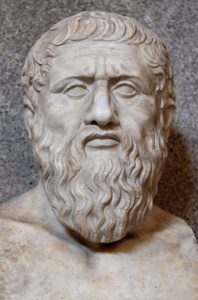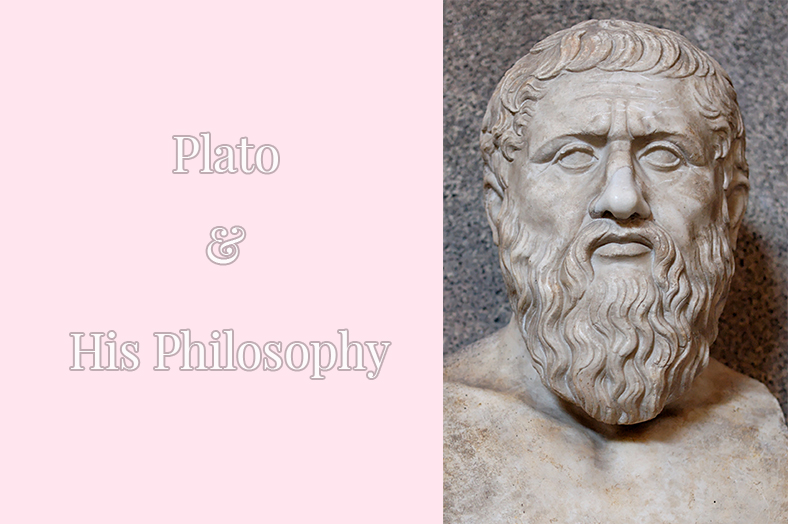 Plato
Plato
Plato was one of the first and most influential philosopher of our time. He was a student of Socrates and a teacher of Aristotle. He was born into a wealthy family, on 427 B.C.E., and he devoted his life to helping people reach a state of what he termed: Eudaimonia – Fulfilment.
Plato had four ideas for making life more fulfilled.
- Think more
We rarely give ourselves time to think more logically. We sometimes just go along with what the Greeks called ‘Doxa’: popular opinions/common sense. Plato wanted us to bring order and clarity to our minds.
- Let your lover change you
Plato says, ‘true love is admiration’. In other words, the person you need to get together with should have very good qualities which you yourself lack. In this way, the right person would help us grow to our full potential.
- Decode the message of beauty
Everyone seems to like beautiful think. Plato wanted to know why. Plato thought that beautiful objects are whispering important truths about the good life. We find things beautiful when we unconsciously sense the quality, we need in them.
Ugliness is a serious matter too. It parades dangerous and damaged characteristics in front of us. It apparently makes it harder to be wise, kind, and calm.
- Reform society
Plato spent a lot of time thinking about how the government and society should ideally be. He is seen as the world’s first utopian thinker. He was inspired by the Athens’s great rival: Sparta. Plato wanted to know how to produce fulfilled people. He figured that celebrities influenced our outlook on life. Therefore, Plato wanted to have celebrities, replacing the current ones, with ideally wise and good people. He refers to them as ‘The Guardians’. These people were models for everyone’s good development. These people would be distinguished by their record of public service, modesty, and simple habits, also their dislike for the limelight and their wide experience.
“Wise men speak because they have something to say; Fools because they have to say something.”
Creator of the first western university.
Plato wanted to end democracy in Athens. The reason for this was because not many people think properly before they vote and therefore, we get very substandard rulers. He did not want to replace democracy with dictatorship, but he wanted to prevent people from voting until they had started to think rationally. To help this process Plato started a school, The Academy, in Athens, which lasted a good 300 years. Pupils there did not only learn maths and spelling, but also how to be good and kind. His goal was that politicians should become philosophers and people thought more deeply.
“the world will not be right, until kings become philosophers or philosophers kings.”
Socrates
Plato gets confused with Socrates quite often, but that was only because Socrates was his mentor and older friend. Socrates taught Plato a lot and his friendship with Socrates altered the course of his life. The methods and arguments Socrates had over the minds and of the youth of Athens gripped Plato as firmly as it did many others, and he became a close associate of Socrates.
Plato’s writing.
Plato’s writing is generally divided into three groups:
- The Socratic dialogues – written from 399 to 387
- The Middle dialogues – written from 387 to 361
- The Later dialogues – written from 361 to 347
Many of these writings concerned the last days of Socrates. This period is considered to be the earliest Socratic period: Euthyphro, the Apology, and the Crito. Euthyphro is an imagined dialogue between Socrates and Euthyphro about Socrates being prepared to enter the Royal Stoa to formally answer the charges against him from accusers. The Apology is presented as the speech given by Socrates in his defense at his trial in 399. The Crito is a piece in which Socrates accepted his punishment of death.
Because of Plato’s high regard for his mentor, many scholars believe that in the apology Plato did not disclose some of the most compelling evidence of Socrates’ guilt. These scholars point out that Plato wrote during a time where he expected many of his readers to have a general knowledge of the trial, reducing any incentive he might have had to present the case of Socrates too sympathetically.
“The learning and knowledge that we have, is, at the most, but little compared with that of which we are ignorant.”
Final years of Plato.
Plato spent his final years at the Academy with his writing. There are many uncertainties of the circumstances of his death, it is certain that he died in Athens around 348 B.C.E. it is known that he was around the age of 80.
“Courage is knowing what not to fear.”
Literature.
Biography. (2020, juni 12). Biography. Opgehaald van Plato Biography: https://www.biography.com/scholar/plato/
Encyclopedia of World Biography. (2020, november 9). Plato Biography. Opgehaald van Notable Biographies: https://www.notablebiographies.com/Pe-Pu/Plato.html
Linder, O. D. (2020, november 9). Plato & Socrates. Opgehaald van Famous Trials: https://famous-trials.com/socrates/832-plato-socrates
The School Of Life. (2020, november 9). The School Of Life. Opgehaald van Plato: https://www.theschooloflife.com/thebookoflife/the-great-philosophers-plato/

